On Accountability and Starting Points.
Standing with Marquisele Mercedes and others harmed by Lindo Bacon and HAES.
I had another essay planned for you this week, but I’ve decided to press pause on that one. There’s another conversation we need to have, about the intense week this has been in the Health At Every Size and fat justice communities.
ICYMI: Mikey Mercedes (a brilliant fat liberation activist and public health scholar, who has been on the Burnt Toast podcast) posted a long and important essay on her Patreon detailing the racism and harm she experienced during several professional interactions with Lindo Bacon, the well-known activist and researcher who authored the book Health At Every Size (and whom I have interviewed and quoted extensively over the years).
Others, including Lindley Ashline, have since come forward to share similar stories. It is clear that Lindo has a longtime pattern of causing harm towards fat folks and people of color, as a thin, white person who has long held a tremendous amount of authority in the world of fat activism. ASDAH (the Association for Size Diversity & Health) has issued a detailed statement that’s worth a close read.
I wholeheartedly believe and support Mikey and everyone speaking out. I hope that Lindo engages with a restorative justice process, and that this is an opportunity, more generally, for white and thin activists in this space to consider our roles and actions. If you value the labor that Mikey has put into sharing her story, please join her Patreon or support her in one of these other ways. She has more ideas for how we can help here.
The discourse that has unfolded online over the past week has been frequently messy and uncomfortable. This is a conversation that brings up many kinds of trauma; it also activates a hell of a lot of white fragility and white defensiveness. It’s been sometimes hard to watch but it is unquestionably harder for folks on the receiving end of tokenism, microaggressions, racism and fatphobia, SO. I’m here to sit in some discomfort and learn.
One particular piece that I’ve been pondering is how Lindo’s work has long served as an entry point to weight-inclusive healthcare and fat politics for many people, especially white women. The Health At Every Size paradigm originated in the fat acceptance movement of the 1970s; it was borne of the labor of Black, brown and fat activists. HAES was not invented by Lindo, or by any one person. But Lindo’s work did a lot to popularize HAES beyond activist circles. Their academic titles and researcher credentials enabled journalists like me to cover HAES in prestige media outlets that often have biased and oppressive rules about who “counts” as a “credible expert.” So Lindo’s work is often where people (especially other thin, white people) begin learning. There has always been a fundamental problem with a thin person playing that part. And it’s a problem that we’ve seen replicated across social media, as (mostly white, mostly thin) dietitians have popularized concepts like HAES and intuitive eating, while allowing fat experiences to become a footnote.
It’s also a problem in my own work.
As a white, cisgender, small fat woman with a decent-sized platform, I hold multiple privileges. And my work (especially this newsletter) also serves as an entry point for lots of folks, especially white moms. I’m thinking hard about the huge responsibility of that role, which I am both honored to play and also don’t think should exist. I think there is a version of this that helps the larger cause of fat liberation. To put it bluntly: I talk to a lot of skinny white ladies, who say some wildly fatphobic things as they are beginning this work, and I hope that by engaging with me on those thoughts, they are then less likely to say them to marginalized folks who are already asked to do too much free labor and understanding. Because we do need white people and thin people to do this work, and it is not the job of Black, brown and fat folks to teach us how.
But, as the events of last week have underscored so clearly, there is also a version of this that harms. Where white small fats and thin people become gate keepers and resource hoarders. Where we get the book deals and the big Instagram followings. Where we become the face of a movement that doesn’t need us and never asked us to play that role.
As a professional writer who produces narrative journalism, I have caused this kind of harm plenty of times. In addition to not challenging my editors on who we used as “credible experts,” I also used to believe it was important to fully identify sources, and didn’t fight hard enough to protect people when naming them would put them at risk. And: I have often told other people’s stories instead of working to support them in telling their own. I know the list is much longer than that.
Shifting the bulk of my work to this newsletter has enabled me to start thinking about how to do better. I haven’t always gotten it right. Initially, I put the Burnt Toast podcast behind the paywall. Then I reckoned with how that meant I was asking guests to talk to me for free,1 but not giving them full access to my entire audience. That limited the podcast’s potential to center marginalized voices. All Burnt Toast guest episodes are now free for everyone. I also offer comp subscriptions to anyone who can’t afford to access the paywalled content. (Just email, no questions asked!)
I’ve also committed to using our community to raise money for progressive causes. This year, that work is the Burnt Toast Giving Circle, which will support progressive candidates in states where voters rights, trans rights, abortion rights, and more are at stake. I’ve made personal donations to the Giving Circle, to ASDAH,2 and to support the work of activists and creators of color.
My next goal for the newsletter is to start paying other writers an above-market rate for their work. I’m not quite ready to announce that program, but it will happen—and when it does, I will prioritize publishing the work of folks whose stories you need to hear.
I asked a friend to read a draft of this piece yesterday and she pointed out that even by listing all of that out, I’m falling into the all-too-common white person trap of wanting to fix this all yesterday, prove I’m a good ally and get my gold star. Which is not helpful and not how any of this works. So I want to be clear that the list above is the bare minimum. I’m publishing this piece today to offer solidarity to those harmed and to hold myself accountable. But there is so much more that I can do, and that the Burnt Toast community can do together. And rather than focusing on a to do list that I come up with, we should focus on what marginalized folks tell us they need. I’ll be getting this wrong, and trying to do better forever, pretty much. But I am listening. And I hope you will continue to hold me accountable when I’m not doing enough.
Thanks for being here.
PS. I’ve opened comments to all on this post, but please note I will be moderating closely and removing any that violate my commenting ground rules.
Journalism ethics prevents us from paying interview subjects. For now this is a rule I follow, though it’s also one I continue to ponder.
Just want to flag that I mistakenly thought ASDAH was a professional org for therapists and dietitians but anyone can join! It’s an important way to financially support HAES activism.



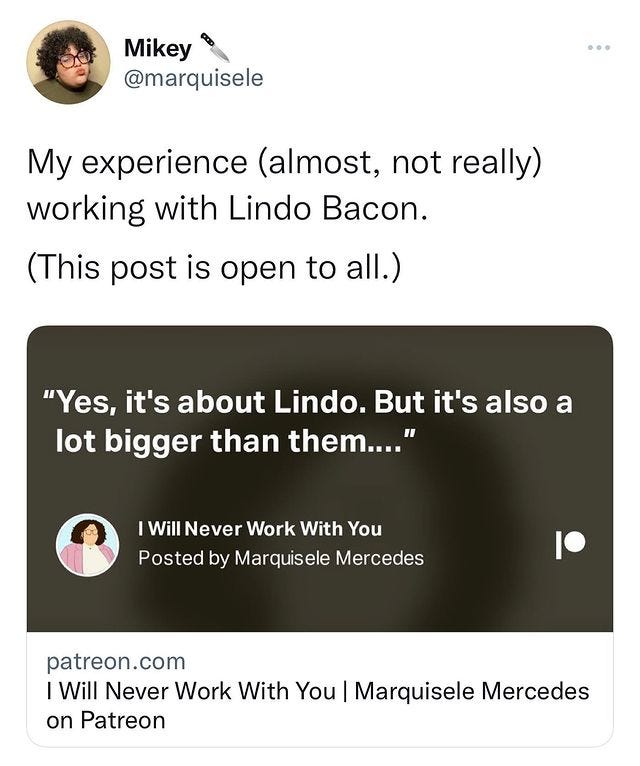
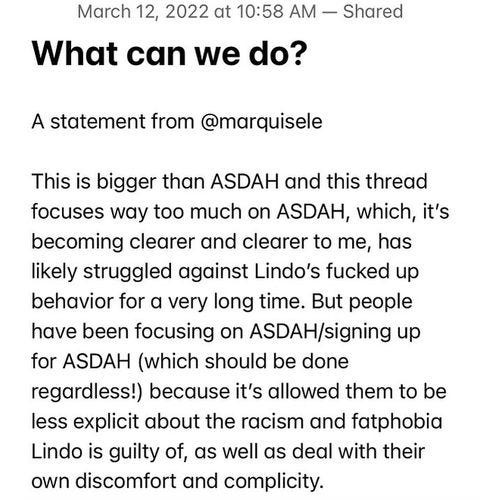
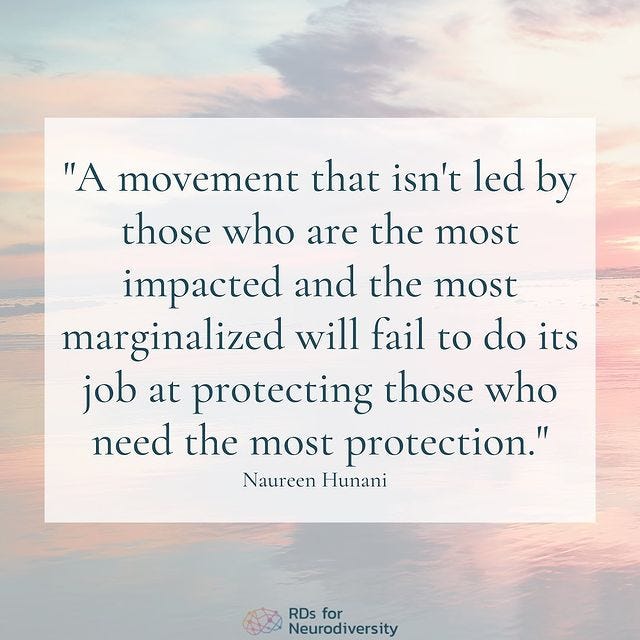
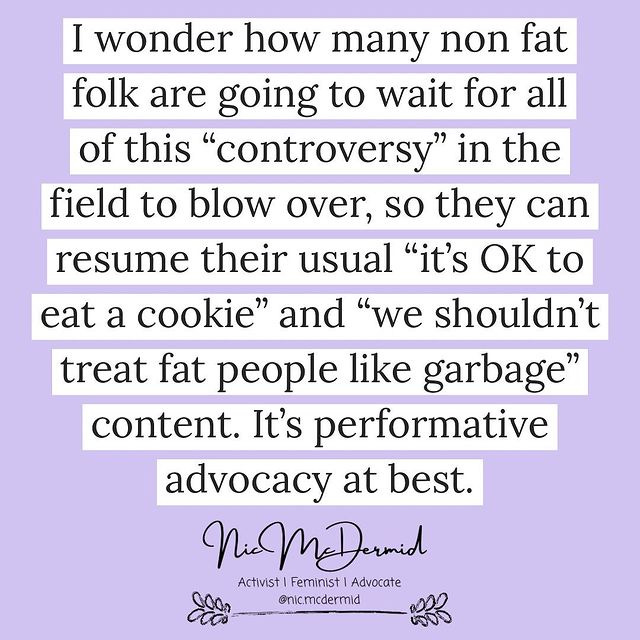
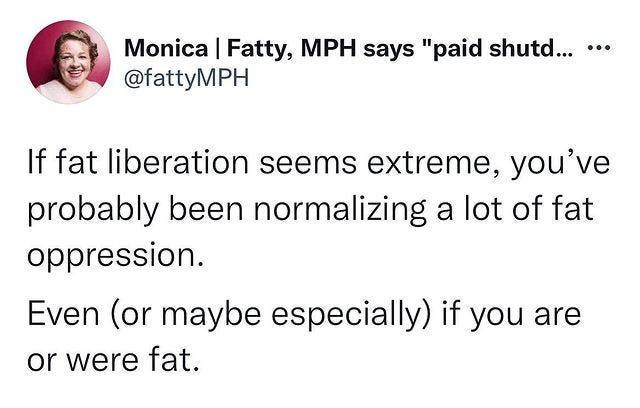
I've been following this all steadily since I first noticed Mikey's Patreon post go out, and I'm just so grateful for her and Lindley and everyone else coming forward. I'm a fat woman who basically bought an entire bookshelf of books on HAES/Intuitive eating/etc. during this ongoing pandemic, and it's eye-opening to take a step back and notice just how many are authored (and also given recommendation/praise blurbs inside the flap!) by thin, white women. I think one of my favorite anti-diet books I noticed had only one plus-size woman who wrote a recommendation. I have been struggling with my self-esteem in relation to my weight before this and I naturally found myself gravitating towards my books by fat authors. I wish I currently had the means to purchase more of these books. But for now, the books I have by Jes Baker, Aubrey Gordon, Sofie Hagan, Roxane Gay, and Joy Arlene Renee Cox-- I turn to them when I need to read from someone who just *understands*. There is such a lived experience with fatness that thinner people don't understand that needs to continue to be reflected and honored.
I wanted to just crawl under my desk as I was reading this note, Mikey’s post, the emails from ASDAH (new to me). To be honest that’s my reaction to almost every Burnt Toast email, not because they’re not worthy - exactly the opposite. All of this discussion is an acknowledgement of the magnitude and implications of fatness, race, privilege and how those are intertwined and it can be overwhelming. I say that as an obese, brown, but otherwise very privileged person who sometimes just wants to forget everything I’ve learned about this topic and would prefer to be oblivious and run back to weight watchers and work towards fitting into a size 18w again because that would be the life. Ignorance is bliss sometimes.
Side note - who else is so tired of people admitting their privilege thinking that said admission somehow erases their privilege? I know I do it too. The whole situation with Lindo felt like “I know I’m privileged and I’d like to bring in other voices to stay credible … but I still want to be too dog. Isn’t that so thoughtful of me?” Oooof